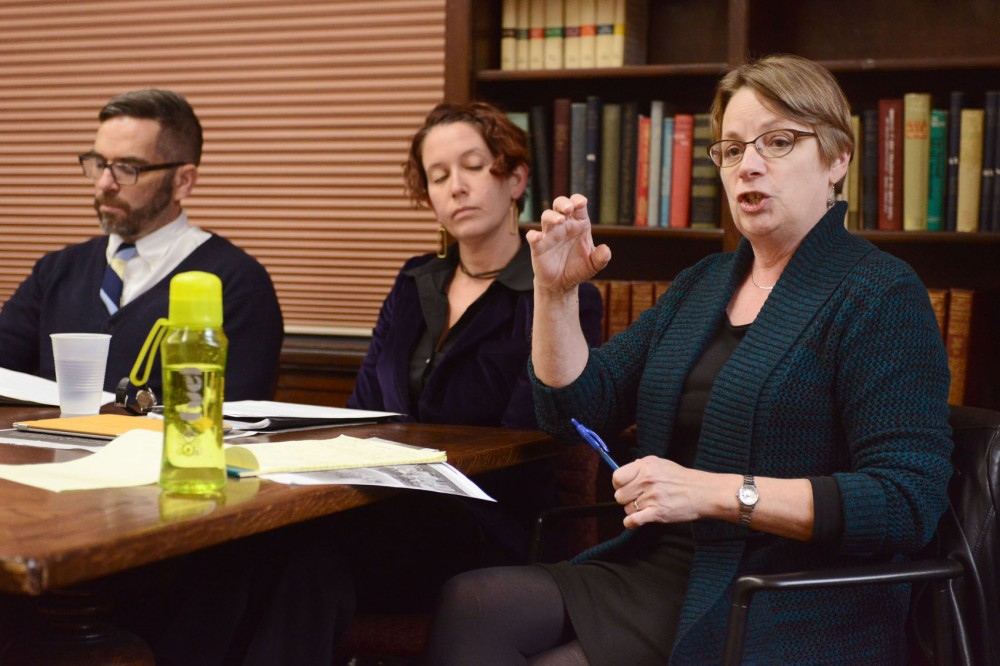From convention platforms to contraceptives, religion comes up in some of today’s most prominent political discussions.
On Monday, a few University of Minnesota professors sat down together at the Nolte Center for Continuing Education to discuss the prevalence of religion in today’s election.
Each of the four professors offered their own thoughts on religious issues in the upcoming elections.
Dara Strolovitch, a political science professor, talked about the involvement of religious groups in Minnesota’s upcoming marriage amendment.
“It’s not terribly surprising to find religious groups opposed to same-sex marriage,” she said. “But here what we find is a huge involvement in progressive religious organizations opposing the ban.”
Strolovitch said she thinks this phenomenon is fairly unique to Minnesota, which she said has a tradition of progressive religious involvement in political issues.
History professor Kevin Murphy touched on the relationship between religion and sexuality in American politics.
“In the past several presidential elections, talk around sex and religion has been quite prolific, and that continued into the [Republican] primary campaign in this election,” he said.
However, after the primary season, Murphy was surprised that sexuality issues had not come up as often between the two presidential candidates, especially given Republican candidate Mitt Romney is Mormon.
Murphy speculated that Romney’s campaign may have avoided talk about his religious preferences to avoid the scrutiny faced by John F. Kennedy in his presidential bid.
“I think that Romney’s Mormonism is really haunted by Kennedy’s Catholicism … there was a fear that actually opening it up to inquiry would be too volatile,” he said.
In addition to religion in the same-sex marriage amendment and sexuality in politics, sociology professor Penny Edgell added the issue of religious identity and voting to the discussion.
She talked about the “nones” — people who don’t identify with a religion.
“They vote Democratic in very large percentages,” she said.
Issues
Political psychology professor Christopher Federico said religion tends to enter political discourse in social issues that deal with morality.
“Moral traditionalism, support for the traditional family, opposition to abortion and things like that tie greater religiosity to greater attraction to the Republican party,” he said.
A Wall Street Journal/NBC news poll showed that 15 percent of voters said social issues were most important, with only the economy ranking higher.
“For some people, it’s quite valuable that discourse have a religious element to it for identity-based reasons,” Federico said. “They value religion, therefore, they want to see it. It’s raised as a theme and as a lens for discussion or perception of events.”
The candidates
President Barack Obama and Romney both have unique religious backgrounds.
Obama has been scrutinized for his religion and his affiliation with Rev. Jeremiah Wright.
Obama cites his religion as Christian, but in a July 2012 Pew Research poll, 17 percent of voters thought he was Muslim while 31 percent weren’t sure of his religious affiliation.
Federico doesn’t think that Obama’s religious history will have as great an effect on voters in this election as it did in his first.
“I think with Obama, the various controversies about his imagined religion has already been priced into peoples’ understanding about who Obama is,” he said. “If a person doubts that Obama’s a Christian or they think that his pastor is wacko, they already don’t like Obama, and there’s really not going to be that much movement.”
Federico said that Romney’s religion mattered more to Republican voters during the primary elections.
“I think for some, but not all, evangelical or Protestant fundamentalist voters there was a certain amount of suspicion of Mormonism being an alien cult or not real Christianity or something like that,” he said. “But I think that as [Romney] became the nominee, the focus shifted toward getting rid of Obama.”



















